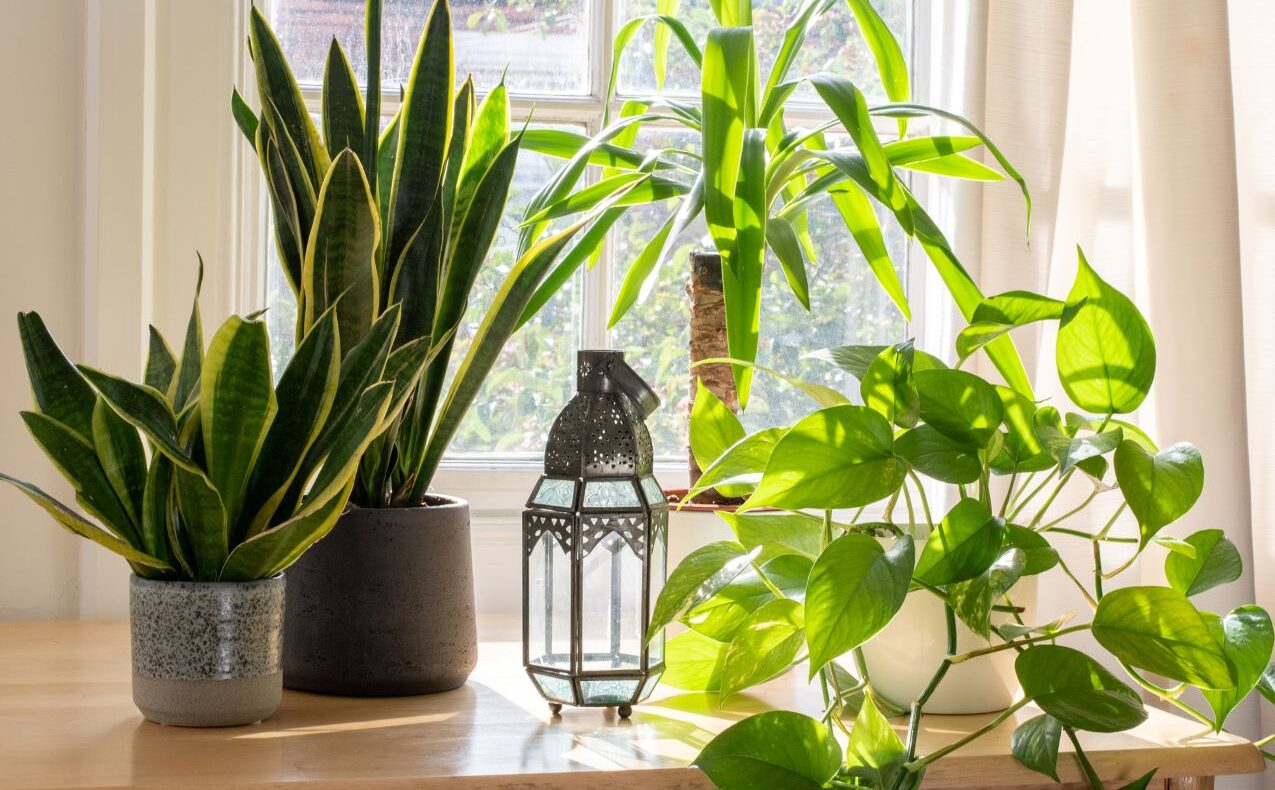 Water? Fertilizer? Light levels? Heat?
Water? Fertilizer? Light levels? Heat?
Caring for houseplants in the winter is crucial if you want them to perform at their best year-round.
A little knowledge and minimal elbow grease is all you need, and your plants will thank you for it. Here’s how to do it.
How much water?
Our homes are often drier in the winter, but that doesn’t mean your plants need extra water. Just the opposite, in fact: They are dormant and don’t need all the water they do in the summer when active growth demands high absorption of nutrients with water as the medium.
Most houseplants should be allowed to dry out completely between watering (overwatering is a common cause of weak, leggy and even dead houseplants). To test for dryness, stick your finger an inch or two into the soil; if it’s dry, water; if it’s moist, keep the tap turned off. Remember, water evaporates more quickly from clay pots, so plants in those pots will need more frequent watering.
Houseplants can generally go two weeks or more without watering. Cacti are happy for a month or two without water (they are desert plants, after all). However, potted citrus plants like lemon and grapefruit need their soil kept moist. An Internet search will bring you up to speed on the moisture requirements of your particular plants.
or more without watering. Cacti are happy for a month or two without water (they are desert plants, after all). However, potted citrus plants like lemon and grapefruit need their soil kept moist. An Internet search will bring you up to speed on the moisture requirements of your particular plants.
Start moving back to your summertime watering schedule as the days get longer.
Tip: To avoid shocking the roots, avoid cold water right from the tap. Instead, let the water come to room temperature and then water gently.
To feed or not to feed
While some experts say to fertilize lightly during the winter, most say don’t. The latter explain that because houseplants are asleep in the winter and don’t need to eat, giving them fertilizer at this time of year can burn their roots or, in some cases, even kill houseplants.
If think your plants need a winter boost, do it with a light application of a 20-20-20 fertilizer or a product like Schultz Plant Food, according to a column by Canadian gardening pro Brian Minter. Make sure the soil is moist before applying fertilizer to prevent root damage.
MORE: Fertilizing your houseplants in the spring
When they start waking up in the spring — look for signs of new growth or more vibrant green in the leaves — it’s time to start feeding them again with a balanced (10-10-10) fertilizer. Dry and liquid fertilizers are available at nurseries and garden centres and, if you follow the directions, easy to apply and effective. Homemade fertilizer, including used coffee grounds mixed with water, can also work wonders. Learn more about feeding houseplants here.
Let there be light (and warmth)
They may be snoozing, but houseplants still need light in the winter because photosynthesis, which converts light into energy, continues.
 One way to ensure your plants get the light they need is keeping them dust-free so light can penetrate to their leaves (thick-leaved succulents like snake plants are especially prone to collecting dust). A damp cloth does the trick for dusty plants, and you can check for bugs on both sides of the leaves at the same time.
One way to ensure your plants get the light they need is keeping them dust-free so light can penetrate to their leaves (thick-leaved succulents like snake plants are especially prone to collecting dust). A damp cloth does the trick for dusty plants, and you can check for bugs on both sides of the leaves at the same time.
You’ll find more advice on light for specific plants here.
When you’re watering your plants, rotate the pots so all sides get the same amount of light and grow evenly.
Houseplants generally do well in the same household temperatures that humans like. Keep them away from drafts and hot spots, including radiators and fireplaces. They’ll thank you for it with good health and vigorous growth come spring.
Sources: HGTV, The Old Farmer’s Almanac, others.
Originally posted January 2021
Got a maintenance task you’re not sure how to do?
Drop us a line at info@allthingshome.ca or message us through Facebook.



